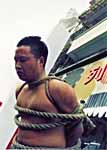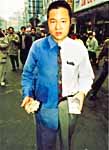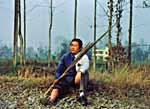|
A young man emerges from a bar in the center of town
dressed in nothing but a simple pair of blue cotton
boxer shorts. His chest is bound with thick rope, and
his hands are tied tightly behind his back. It is the
coldest day of the year in Chengdu, capital of western
China's Sichuan province.
The man shivers slightly
as he kneels down on a low black platform.
Standing next to him
are two columns, one red and one white. On top of the
six-foot red column sit two microphones. Peering down
from the white column, which measures about 10-feet
tall, is a bust of Beethoven. Music starts to float
out of a loudspeaker almost immediately as a small crowd,
bundled up in thick coats, hats and scarves, gathers
around to watch the spectacle. For the next hour and
45 minutes, a selection of Beethoven's most popular
works serenades the crowd while the man in the boxer
shorts kneels on the platform, his body convulsing from
the cold, all for the sake of art.
The young man is 28-year-old
Luo Zidan, a seasoned performance artist from Sichuan,
currently living with his wife in the "artists ghetto"
Tongxian, a suburb on the outskirts of Beijing. Luo
is already renowned in his hometown as the creator of
over 40 different performances in the past five years.

Early this year Luo
came to Beijing to seek new stimulus and further develop
his art. In the short time he has been here, Luo has
already made a name for himself as one of the most prolific
and in-your-face performers on the capital's contemporary
art scene.
Luo was born November
1, 1971, in the small Sichuan town of Luzhou. There
is nothing specific about his childhood that caused
him to grow up, parade the streets in his boxers in
the dead of winter and call it a job. After graduating
from high school in 1989 Luo entered the Chongqing Fine
Art University, although he left after a year disillusioned
with the education system which he considers too restrictive.
In 1991 he began to experiment with various art mediums
but it was not until 1995 that he staged what he calls
his first "proper" show entitled Behavior of a White
Collar.
As I talk to him, Luo
looks more like a banker than an artist. Dressed neatly
in a navy-blue turtleneck and pressed trousers, he perches
upright on his stool, his hand gingerly cupping a glass
of tea that he never drinks. He stares at me intently
from behind his wire-rimmed glasses, as if he still
can't quite work out what I'm doing in his apartment.
Yet at the same time he seems eager to please, listening
attentively and answering every question with care.
For all his wariness, however, he assumes a different
character altogether when performing.
"When you see my art,
it is not me," he explains. "I lose myself in my work."
In a recent, unadvertised
event at Beijing's premier weekend playground, Club
Vogue, Luo performed a piece entitled Satire of the
Intellectual Hoodlum. Throughout the half-hour act,
Luo lounges on a sofa wearing a white lacey veil over
his face. Throwing his legs in the air, he flaunts his
large, partially exposed belly and commands a waitress
to pour him glass after glass of whiskey. At one point,
Luo violently smashes his glass on the stage floor.
Meanwhile, projected
on a screen behind him is a video of an earlier performance.
The video, shot in shaky hand-held documentary style,
shows Luo dressed in a suit and tie using long wooden
tongs to pick through a garbage dumpster for flimsy,
red RMB1 notes - much like workers sift through rubbish
looking for recyclables. One by one, he tosses the notes
into a bamboo basket strapped to his back.
The artist's exploration
of the role of the "new intellectual" in modern-day
Chinese society is a common theme in Luo's works. In
particular, he seeks to remind all Chinese to never
forget their humble peasant roots.
As Luo explains, "Chinese
society has moved forward so quickly, but no matter
how much money Chinese people earn, we will always have
a peasant heart."
In one of his more well-known
series, Half White Collar, Half Peasant, Luo examines
in detail the dichotomy between the peasant and the
intellectual in today's society. For this, Luo creates
a special costume, deftly sewing together half of a
drab blue outfit, typical of a Chinese laborer, with
half of an ensemble of a white-collar worker.
Performing in streets
across Sichuan, Luo explores the different responses
of the two classes to everyday situations. A videotape
of one act shows Luo the laborer cleaning a shiny Mercedes
Benz with his sleeve while another shows Luo the white-collar
worker having his shoes shined. There is nothing abstract
or complicated about Half White Collar, Half Peasant,
but the upshot is powerful and thought-provoking.

Luo says he tries to
make his messages instantly accessible to his audience
members, whether it's a passerby outside a Sichuan bar,
a father on his way to take out the family garbage,
or a young Spanish painter in a dimly-lit nightclub.
His boxer-clad performance
of Dead and Living speaks volumes about the status of
artists when dead (revered) and alive (scorned). It
also hints at how Luo himself sees the status of artists
in China. Bound in rope and shaking with cold, Luo demonstrates
that the artist's spirit never gives up. But the disparity
in height between the white pillar and the low black
platform upon which Luo is kneeling suggests that in
China, perhaps, this may be a futile struggle.
Sometimes, his work
is just plain odd.
In a piece entitled
Impulsive Hair, a 75 kilogram pile of rainbow-hued human
hair is placed upon a large loudspeaker in a disco.
Traditional Chinese music, which initially drifts out
of the speaker, is suddenly replaced by violent techno
tunes which causes the mass of hair to shake and vibrate
as if it has a life of its own. At this point, Luo invites
members of the audience to join the hair for a dance.
Although some of his
pieces are better known than others, Luo rarely performs
an act more than once, preferring to expand on existing
themes or improvise upon new ones. At the same time
he is always drawing inspiration from ordinary events
that surround him. "I make use from uselessness," he
explains.
In a rare moment of
self-praise, Luo goes out of his way to explain how
he considers himself more than just another artist,
but a necessary voice in China's rapidly-changing society.
"For me, the duty of
an artist is to awaken the collective conscience," he
says, before pausing and growing cautious again. "But
my art certainly does not contain any criticism of the
government. I am simply recording history."
When I toss him my last
question, "When and where will you be performing next?"
Luo, despite his best intentions to help a struggling
writer, is at a loss for an answer.
"I don't know" he laughs.
"I'm not God. I don't know when it will happen, it just
will."
Keep your eyes and ears
open for future Luo Zidan performances in Beijing.
For more information,
see Luo's English-language website at: www.zi-art.com.
|





